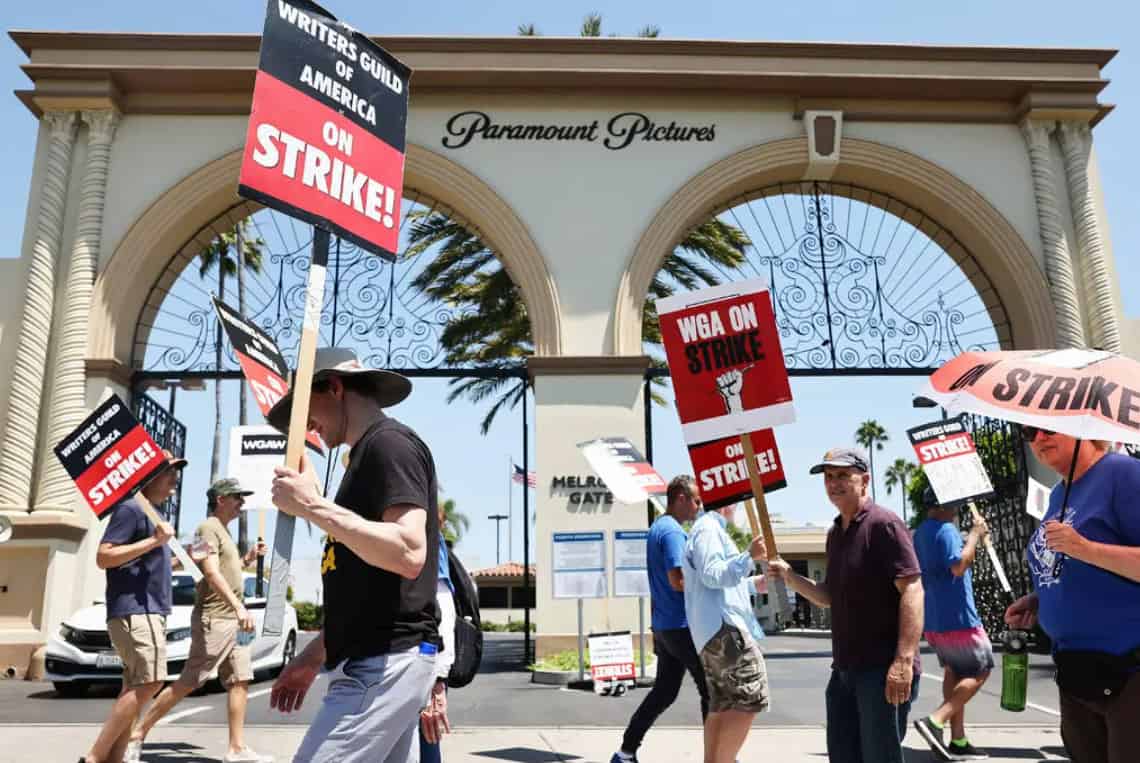Whenever it looks like workers might be going on strike, headlines focus on costs to companies and to consumers. The simultaneous strikes by the Screen Actors Guild-American Federation of Television and Radio Artists and the Writers Guild of America are primarily making the news because movies and TV shows are getting delayed.
Instead of focusing on the temporary inconveniences caused by strikes, we should recognize strikes for what they are: a way for workers to protest oppressive and unfair conditions.
In a speech to the 1984 Democratic National Convention, presidential candidate and reverend Jesse Jackson said “we must not measure greatness from the mansion down, but the manger up.” Jackson looked at President Reagan’s “shining city on a hill,” and his heart ached for the millions kept in the cold by its impenetrable walls.
It can often seem natural to think of the mansion instead of the manger, and corporate media certainly won’t help you do otherwise. To understand this summer’s strikes, however, it’s essential to understand why workers choose to go on strike and not just what the strikes mean for companies’ bottom lines.
In July, Fran Drescher, president of SAG-AFTRA and star of ’90s sitcom “The Nanny,” announced that actors would join members of the WGA in the first tandem strike since 1960. In an emotional speech, she said that “employers make Wall Street and greed their priority and they forget about the essential contributors that make the machine run.”
Employers aren’t just forgetting about their workers, they’re actively trying to make workers suffer and are breaking the law to do so. One studio executive admitted to wanting the WGA strike to continue until “union members start losing their apartments and losing their houses.”
It’s not just the entertainment industry, though. In our backyard, Brookwood, Alabama, Warrior Met Coal repeatedly violated national labor laws during an almost two-year-long strike by the United Mine Workers of America. Starbucks is also in a protracted battle with the National Labor Relations Board because the coffee chain keeps illegally firing union workers and shutting down unionized stores.
When workers choose to unionize and/or strike, it’s because executives have revealed their contempt for the rights and basic dignity of their employees. It’s because, as Rob Delaney said, workers “see the caviar being passed around on a fricking yacht” while they’re struggling to put food on the table.
When we hear about a strike, we need to think about more than just our pocketbooks. You are not just a consumer, a source of corporate revenue. You’re a member of a community which flourishes only when people help each other out of more than base self-interest.
We should all support unions and workers from our own homes, but for American unions to be really revitalized, they’ll need the support of the “People’s House.” In recent months, the White House has been flaunting the success of “Bidenomics.” As a proposed economic restructuring, it’s still unclear whether Bidenomics will follow the New Deal and respect workers’ rights as the essential foundation of a fair and equal economy.
Despite kicking off his reelection campaign with a rally hosted by the AFL-CIO, President Biden’s record on labor issues is an undeniably mixed bag.
Most notoriously, Biden helped Congress block American rail workers from striking last year. But Al Russo, the director of the International Brotherhood of Electrical Workers’ railroad department, testified that the White House “continued to work behind the scenes to get all of rail labor a fair agreement for paid sick leave.”
Sen. Joe Manchin, D-W.Va., is stonewalling Julie Su’s confirmation as Secretary of Labor because she’s too pro-labor, and Biden’s NLRB, unlike Trump’s, is actually cracking down on corporations — both great signs!
At the same time, the UMWA says it will continue its 15-year streak of not endorsing a presidential candidate due to the lack of “a single good-paying union job that has been created for a dislocated coal miner to step into.” The United Auto Workers are similarly refusing to endorse Biden until their concerns about wages and conditions in new electric vehicle factories are addressed.
If Biden really wants to “fundamentally change the economic direction of our country,” as the White House says, he must commit himself to fully supporting organized labor. They should be doing everything they can to prevent companies from interfering in unionization efforts and to help the WGA, SAG-AFTRA and other unions win good contracts.
To live in an America where the least among us are treated fairly and where their voices are heard, it’s essential to always support workers struggling under their employer’s thumb.
“We are not a perfect people. Yet, we are called to a perfect mission,” Jackson said. “Our mission: to feed the hungry; to clothe the naked; to house the homeless; to teach the illiterate; to provide jobs for the jobless; and to choose the human race over the nuclear race.”
A lot of American workers are striking this year, protesting poor conditions and poor pay. To answer our perfect calling, we need solidarity. We need solidarity to be the ethos of our time, to reverberate in the suburbs and to ring forth in D.C.
We all need to make a habit of thinking about mangers and not mansions. As a community member, you should support your local unions trying to win job security, safe working conditions, and good pay and benefits for their members.
When filling out a ballot, think about which candidates will actually protect your workplace rights. Check if your local union chapters are asking for any support you could help provide. The WGA and SAG-AFTRA are not calling for a customer boycott right now, but if they do, you should participate. To quote New York’s best nanny, “Never, ever, ever cross a picket line.”









